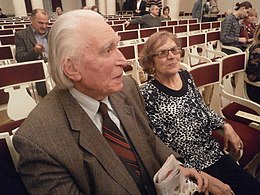Lev Kolodub
Ukrainian composer and teacher (1930–2019) From Wikipedia, the free encyclopedia
Lev Mykolajovych Kolodub (Ukrainian: Левко́ Микола́йович Колоду́б; 1 May 1930 – 23 February 2019) was a Ukrainian composer and teacher, Honored Artist of Ukraine (1973), People's Artist of Ukraine (1993),[1] recipient of the Shevchenko National Prize (2010), and head of the Ukrainian Music Foundation (1988—1994) Kyiv branch of National Union of Composers of Ukraine (1994—1999).
Lev Kolodub | |
|---|---|
| Ukrainian: Левко́ Микола́йович Колоду́б | |
 Kolodub and his wife, Zhanna, in 2015 | |
| Born | 1 May 1930 Kyiv |
| Died | 23 February 2019 (aged 88) Kyiv |
| Education | Kharkiv Conservatory |
| Occupations |
|
| Organizations | |
| Awards | |
Biography
Lev Kolodub was born on 1 May 1930 in Kyiv. His mother was an opera singer, and her grandmother was a music teacher. He studied at the Kharkiv Secondary Specialized Music Boarding School as a clarinetist and later at the Kharkiv Conservatory as a composer.[1] After graduating from the conservatory in 1954 he worked in Kyiv.
From 1958 to 1960 he taught music theory at the Kyiv Theater Institute, and from 1966 he taught at the Kyiv Conservatory, from 1985 as professor. In 1997 he headed a recently established Music Information Technology Department of the Kyiv Conservatory.
From 1994 to 1997 he was the chairman of the Kyiv branch of the National Union of Composers of Ukraine.
He was from 1997 a corresponding member and from 2005 an academic of the Academy of Arts of Ukraine.
Lev Kolodub was married to Zhanna Kolodub, a Ukrainian composer and pianist.
He died on 23 February 2019 in Kyiv at the age of 88.[2]
Legacy
Summarize
Perspective
The creative legacy of Levko Kolodub includes 4 operas, 4 operettas, 2 ballets, 12 symphonies, numerous concertos for wind instruments with orchestra, as well as chamber music and music for cinema. Pieces for wind instruments hold a special place and have been highly appreciated by Ukrainian musicians. His symphonic music is based in Ukrainian folklore and usually carries some kind of an agenda. The 9th, 10th and 11th symphonies were awarded with the Shevchenko National Prize.[3] Although he was never part of the avant-garde movement of the 1960s, he was a composer of interesting and colourful music and always a superb craftsman.[1]
Selected works
|
|
|
Notes
- "A Duma about Turbay": about the peasant Turbay Rebellion
References
External links
Wikiwand - on
Seamless Wikipedia browsing. On steroids.
